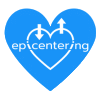About Neil Shearing And Epicentering
Epicentering is a way of thinking, feeling and acting developed by Neil Shearing, Ph.D., to better understand ourselves and live to our full potential.
Neil developed Epicentering to heal from his own long-term depression after applying what he learned in therapy together with his own scientific research and insights.
Science is beginning to realise the power of the human mind to influence our thoughts, beliefs, emotions and our physical and mental health.
No longer is the brain seen as static, fixed, rigid (see "neuroplasticity").
No longer is our DNA seen as static, fixed, rigid (see "epigenetics").
Finally, science is realising we are complex, intricate, continually adapting and wonderful.
But science has problem.
Doing experiments on human minds is very, very difficult. How can science untangle the mysteries of the mind and the intricacies of the power it exerts over the body?
Let me quote the Wikipedia page about psychology...
"Some types of experiments cannot be done on people because the process would be too long, expensive, dangerous, unfair, or otherwise unethical.
Science has come a long way, but it has pretty much reached a boundary wall with regard to exploring the mind without a huge investment of time and money.
So, do we stop there?
No. We build on what science has already proven and take it to the next level. We take the next logical step and let the scientific proof follow if and when it can.
So, what has science proven?
We KNOW the human mind can exert power over the body. Meditation can cause gene expression changes. In fact, pretty much anything we do results in gene expression changes.
We KNOW we should live a healthy lifestyle, but we don't. Why? Because we're not present in each moment. We're not mindful of the choices we make.
If you KNEW that each donut you ate triggered the release of chemical cascades which, over time, made it more likely you'd get type 2 diabetes, AND you were mindful at the time, would you eat it? Perhaps mindfulness is the difference between enjoying a bite and devouring the box full!
If you were mindful enough to know that wanting the donut was due to being triggered by an event which reminded you of a childhood trauma, would you recognise that the solution lay in dealing with the trauma and not eating the donut?
So, through meditation and mindfulness we have TWO ways to change our lifestyles and live better healthier, happier, more positive lives.
But there's also another benefit. Through mindfulness we can improve the choices we make in life. We can stop the negative self-talk and replace it with thoughts of positive self-esteem. We can be aware of our interactions with others and actively listen to them, accept what they say and respond with compassion and understanding rather than with mindless, hurtful comments. So our relationships will improve as well as our own mental and physical health.
All the positive changes will be working in our bodies through epigenetic mechanisms which will be changing the expression levels of a huge array of genes. Some genes will be upregulated. Some will be silenced.
THAT's what Epicentering is. It's the coming together of the mind, body, spirit and science to produce dramatic positive changes in our physical health, mental health and relationships.
Epicentering is tapping the power within us all to effect change in our own lives so that we may live them more fully, for the benefit of ourselves and everyone we contact. It draws on the science of molecular biology, psychology and the inner wisdom we all possess but routinely ignore.
Advisor Roles
Neil is proud to be an unpaid advisor to SIGA as they develop a system to end depression using neuroscience and AI.
Recommended Resources
I've had the pleasure of exchanging emails with these authors, who are knowledgeable in their fields and kindly shared their ideas.
Andrew Devendorf, Ph.D.
Andrew is a clinical psychologist and published researcher working in the field of reducing the barriers to help-seeking behaviour in mental health and the stigma associated with mental ill-health.
Dr Robert Lefever
Robert specialises in addiction recovery and I found his book, "A New Life: Healing Depression" to be very interesting.
Jodie Skillicorn, DO
I really enjoyed Jodie's book, "Healing Depression Without Medication" and her holistic approach to healing depression.
Martha Manning, Ph.D.
Martha's account of her personal descent into depression ("Undercurrents") was particularly moving.

